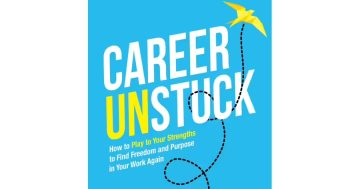Elizabeth Grace Saunders* says being busy is fine up to a point — but how much ‘busyness’ is actually getting in the way of things you really should be doing?
 Did my colleague Brenna enjoy the conference? I should send a chat message to ask her now.
Did my colleague Brenna enjoy the conference? I should send a chat message to ask her now.
I just overheard a colleague mention an issue with a project where I might be able to help.
I’ll walk over to offer my suggestions.
Sounds familiar? These actions are not wrong in themselves, but if your day is filled with this type of self-generated busyness, there’s a problem.
Self-generated busyness can crowd out the important things we need to do in our personal and professional lives.
Allowing yourself to be ‘too busy’ can keep you from actually getting things done.
As a time management coach, I have found that the only way to get where you want to in life is to stop the self-created swirl of unnecessary tasks.
Here are some busyness barriers that can hold you back from being productive and how to overcome them.
Keeping up with everything
Today it’s possible to distract yourself 24/7 with a flow of information that never stops and never ends.
There’s always more social media, news, movies, and television to consume.
At work, this could look like incessantly checking LinkedIn, congratulating everyone in your network of thousands on their work anniversaries, or reading every article that pops up related to your industry.
Outside of work, this could look like binging social media, news, and Netflix facilitated by an infinite stream of input.
If these activities consume hours every day, it’s very likely you’re generating unnecessary busyness.
Consider deciding which social media or news sources are most meaningful to you.
For example, I’m not on Instagram, but I am on LinkedIn.
Then decide how much of your time these platforms deserve.
Set a limit on your media consumption depending on your true needs.
When you set limits, remind yourself that it is impossible to keep up with the onslaught of information and you deserve to prioritise what is truly important.
Thinking of new ideas — but never seeing them through
Innovation is a good thing, but if every time you sit down to work on a current project, your mind suddenly flits to something else, there’s a problem.
Coming up with an idea is typically only a small part of the productivity equation.
Seeing things through to the end is what generates results.
When you notice the temptation to avoid the already started for the not yet begun, give yourself permission to write down the idea for future reference and then redirect your attention to the task at hand.
If that’s exceptionally hard for you, you may even want to consider app or website blockers such as freedom.to, which you can turn on to keep you focused instead of running down other rabbit holes.
Non-stop socialising
I’m absolutely not suggesting you become a hermit so that you can simply get more things done.
However, all of us must find a balance between spending time with others and having the time and space to be productive.
That trade-off can look different for each individual depending on their introversion or extroversion needs and the roles they play.
One sign that you might have an unhealthy balance could be that you’re completely caught up on what’s going on in all of your co-workers’ families’ lives, but you can never end work in time to catch up with your own family.
Or that you’re busy with friends, meetings, and events so often that there’s never time to put your home in order or to keep up with essential tasks.
Try to limit the amount of time you spend on personal catch-ups at the beginning or end of meetings.
Refrain from messaging a colleague every time you think of something random to ask or share.
Consider doing a walk around the office to talk to people as a reward once you’ve gotten an important task done.
Outside of work, I strongly recommend that you reserve at least one evening during the work week for getting personal tasks done.
Taking on too many responsibilities
Just because something is an issue doesn’t mean that you have to solve it alone.
That could mean not jumping in when a colleague mentions something that needs to get resolved but isn’t really within the scope of your role.
It could mean not volunteering to help with an initiative that is of interest to you but would preclude you from finishing the tasks you really need to do.
Does this mean you’re never helpful, or never volunteer? No.
It does mean you don’t go out of your way to entangle yourself in solving problems for other people when you don’t have enough time to keep up with your own.
There may be times in your life when you are truly busy, but there may also be times when you are self-generating a lack of time by adding in things that you don’t need to do.
If you find yourself in the latter category, use the above tips to overcome your busyness barriers and to get the most important things in your life done.
*Elizabeth Grace Saunders is a time management coach and the author of Divine Time and How to Invest Your Time Like Money.
This article first appeared on the Fast Company Website.











